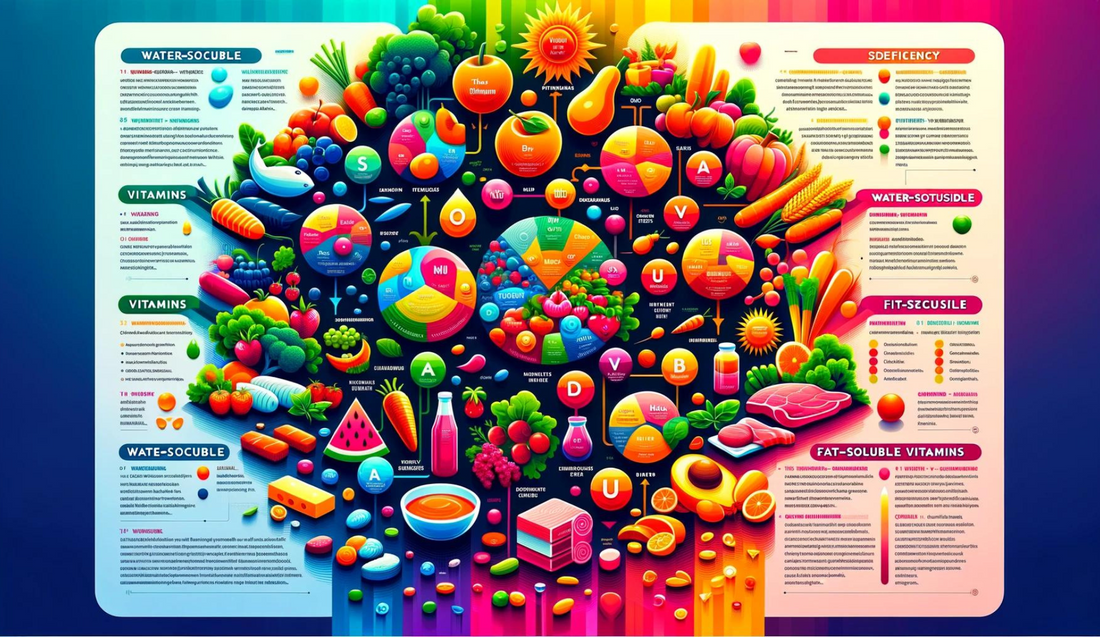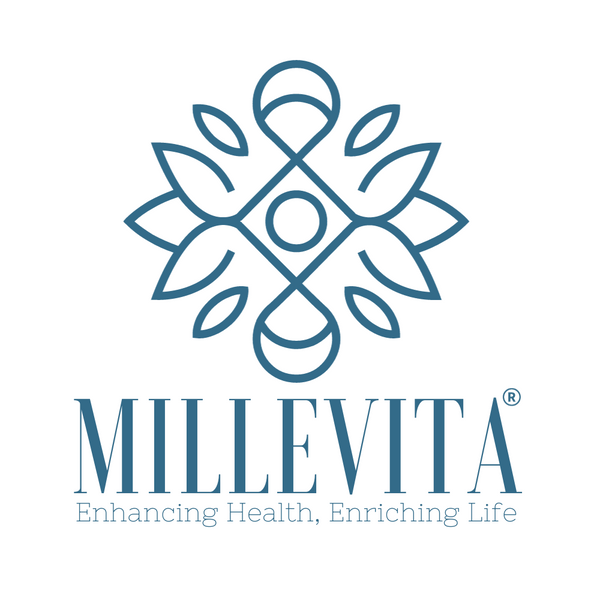
Essential Nutrients Unveiled: A Comprehensive Guide to Vitamins
Share
Vitamins are essential nutrients that play critical roles in various bodily functions and processes. They are categorized into two groups based on their solubility: water-soluble and fat-soluble vitamins. Each vitamin has unique functions, sources, and benefits, making them indispensable for maintaining health and preventing diseases. This article explores the various types of vitamins, highlighting their key characteristics, dietary sources, and health implications.
Water-Soluble Vitamins
Water-soluble vitamins are not stored in the body and must be consumed regularly in the diet. They are easily absorbed by the body and, except in certain cases, excess amounts are excreted in urine.
Vitamin C (Ascorbic Acid)
Vitamin C is an antioxidant that supports the immune system, aids in the absorption of iron, and promotes healthy skin and tissue repair. Sources include citrus fruits, strawberries, kiwi, bell peppers, and green leafy vegetables.
B Vitamins
The B vitamins are a group of eight vitamins that play a vital role in energy metabolism and the formation of red blood cells. They include:
- Thiamine (B1): Essential for energy metabolism and nerve function. Found in whole grains, pork, and legumes.
- Riboflavin (B2): Important for energy production and skin health. Sources include milk, eggs, lean meats, and green vegetables.
- Niacin (B3): Supports energy production, skin health, and the nervous system. Available in meat, fish, poultry, and whole grains.
- Pantothenic Acid (B5): Involved in the synthesis of hormones and cholesterol. Found in almost all foods, including chicken, beef, potatoes, and oats.
- Pyridoxine (B6): Crucial for protein metabolism and cognitive development. Sources include fish, beef liver, potatoes, and non-citrus fruits.
- Biotin (B7): Supports metabolism of fats, carbohydrates, and proteins. Egg yolks, nuts, and legumes are good sources.
- Folate (B9): Essential for DNA synthesis and cell division. Found in green leafy vegetables, legumes, and fortified foods.
- Cobalamin (B12): Necessary for red blood cell formation and neurological function. Available only in animal products like meat, eggs, and dairy.
Fat-Soluble Vitamins
Fat-soluble vitamins are stored in the body's fatty tissue and liver. They are absorbed along with fats in the diet and can be stored in the body for long periods.
Vitamin A (Retinol)
Vitamin A is crucial for vision, immune function, and skin health. It can be found in two forms: preformed vitamin A in animal products like dairy, fish, and meat, especially liver, and provitamin A in plant-based foods like carrots, sweet potatoes, and leafy greens.
Vitamin D
Vitamin D is essential for calcium absorption, bone health, and immune function. It can be synthesized by the skin from sunlight and is found in fatty fish, egg yolks, and fortified foods.
Vitamin E (Tocopherol)
Vitamin E is an antioxidant that protects cells from damage and supports immune function. Sources include vegetable oils, nuts, seeds, and green leafy vegetables.
Vitamin K
Vitamin K is crucial for blood clotting and bone metabolism. It can be found in green leafy vegetables, vegetable oils, and fermented foods.
Shop Vitamin supplements
Conclusion
Vitamins are essential for maintaining health and preventing diseases. A balanced diet rich in a variety of foods can provide all the vitamins your body needs. However, some individuals may require supplements to meet their nutritional needs due to specific health conditions, dietary restrictions, or life stages. It's important to consult with a healthcare provider before starting any supplement regimen to ensure it's appropriate for your health needs.
Disclaimer:
This article is provided for informational purposes only and is not intended as medical advice. The content is not meant to replace professional medical advice, diagnosis, or treatment. Always seek the advice of your physician or other qualified health provider with any questions you may have regarding a medical condition or dietary supplements. The information may not cover all possible uses, directions, precautions, interactions, or adverse effects. Reliance on any information provided in this article is solely at your own risk.



